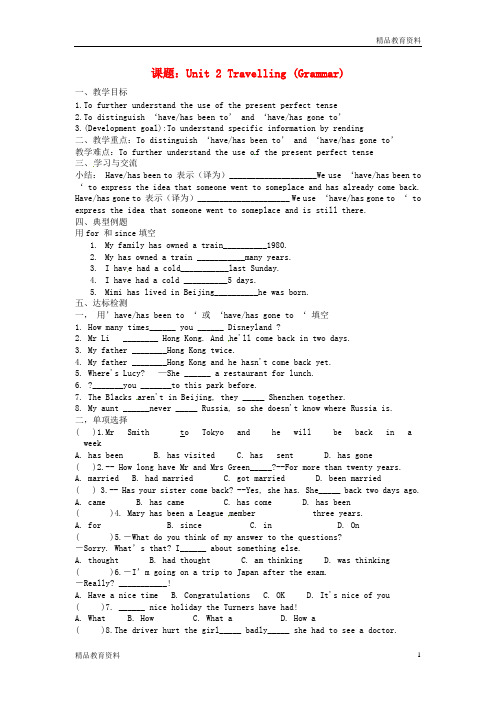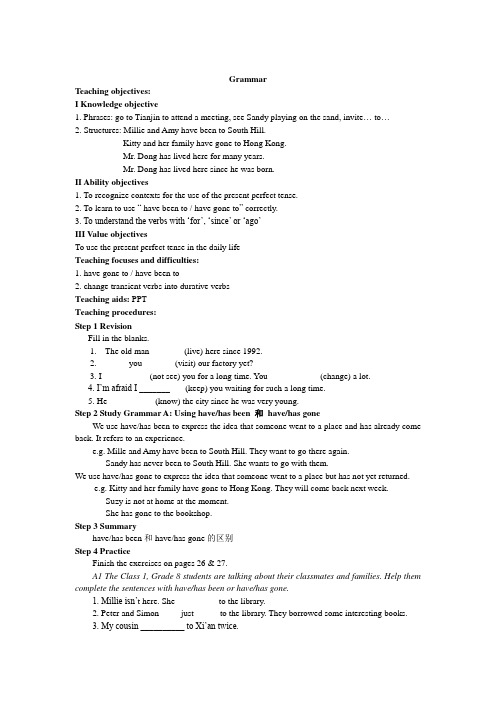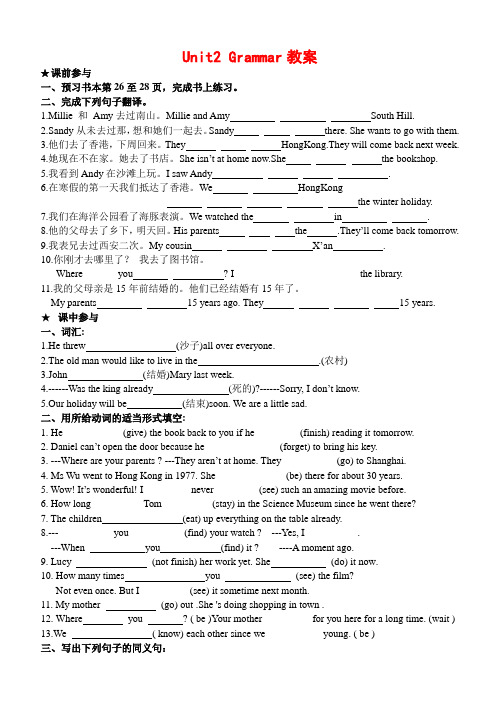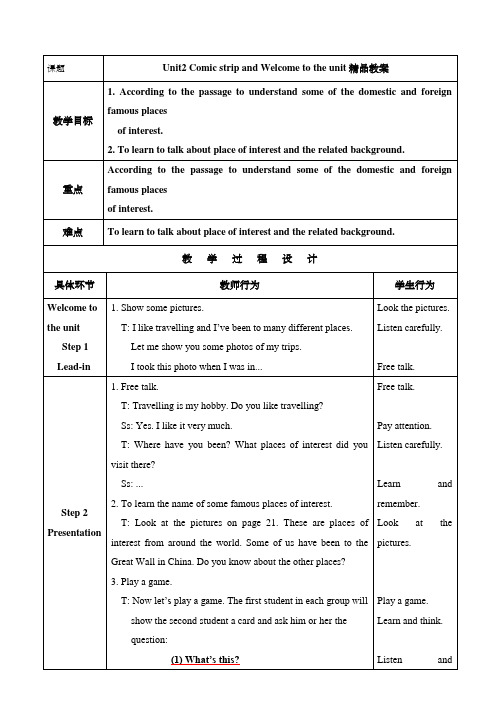牛津译林版英语八年级下册U2 Grammar 教案
- 格式:doc
- 大小:53.50 KB
- 文档页数:3

课题:Unit 2 Travelling (Grammar)一、教学目标1.To further understand the use of the present perfect tense2.To distinguish ‘have/has been to’ and ‘have/has gone to’3.(Development goal):To understand specific information by rending二、教学重点:To distinguish ‘have/has been to’ and ‘have/has gone to’教学难点:To further understand the use o f the present perfect tense三、学习与交流小结: Have/has been to 表示(译为)____________________We use ‘have/has been to ‘ to express the idea that someone went to someplace and has already come back. Have/has gone to 表示(译为)_____________________ We use ‘have/has gone to ‘ to express the idea that someone went to someplace and is still there.四、典型例题用for 和since填空1.My family has owned a train__________1980.2.My has owned a train ___________many years.3.I hav e had a cold___________last Sunday.4.I have had a cold __________5 days.5.Mimi has lived in Beijing__________he was born.五、达标检测一,用’have/has been to ‘或‘have/has gone to ‘填空1. How many times______ you ______ Disneyland ?2. Mr Li ________ Hong Kong. And he'll come back in two days.3. My father ________Hong Kong twice.4. My father ________Hong Kong and he hasn't come back yet.5. Where's Lucy? —She ______ a restaurant for lunch.6. ?_______you _______to this park before.7. The Blacks aren't in Beijing, they _____ Shenzhen together.8. My aunt ______never _____ Russia, so she doesn't know where Russia is.二,单项选择( )1.Mr Smith to Tokyo and he will be back in a weekA. has beenB. has visitedC. has sentD. has gone( )2.-- How long have Mr and Mrs Green_____?--For more than twenty years.A. marriedB. had marriedC. got marriedD. been married( ) 3.-- Has your sister come back? --Yes, she has. She_____ back two days ago.A. cameB. has cameC. has comeD. has been( )4. Mary has been a League member three years.A. forB. sinceC. inD. On( )5.-What do you think of my answer to the questions?-Sorry. What’s that? I______ about something else.A. thoughtB. had thoughtC. am thinkingD. was thinking( )6.-I’m going on a trip to Japan after the exam.-Really? ___________!A. Have a nice timeB. CongratulationsC. OKD. It's nice of you( )7. ______ nice holiday the Turners have had!A. WhatB. HowC. What aD. How a( )8.The driver hurt the girl_____ badly_____ she had to see a doctor.A. so, thatB. either, orC. too, toD. neither, nor( )9.They_ China for two yearsA. have been toB. have been inC. have gone toD. hav e come to( )10.Mr Green isn't in the office ,He to the libraryA. has goneB. wentC. has beenD. will go三、句型转换1. He joined the army two years ago.He ____ _____ ______the army for two years.It is_______ ________since he _________the army.2. Amy bought the motorcycle two y ears ago.Amy _______ _______the motorcycle ________two years.3. The boy borrowed Harry Potter from the library three years ago.The boy ______ ________Harry Potter fro m the library _________three weeks.4. The parade began 2 hours ago.The parade_________ _______ ______ _______2 hours.5. The conference stopped last Saturday.The conference_______ _______ _________ __________last Saturday.6. My brother arrived here 2 days ago.My brother_______ _______here_______2 days.7. My cousin came to Beijing two weeks ago.My cousin_______ _____ ______Beijing _______two weeks.8. I have worked here since I came here .(对划线部分提问)9. They got marri ed ten years ago. (同义句)四、完成句子1. 我是三年前加入阅读兴趣小组的。

GrammarTeaching objectives:I Knowledge objective1. Phrases: go to Tianjin to attend a meeting, see Sandy playing on the sand, invite… to…2. Structures: Millie and Amy have been to South Hill.Kitty and her family have gone to Hong Kong.Mr. Dong has lived here for many years.Mr. Dong has lived here since he was born.II Ability objectives1. To recognize contexts for the use of the present perfect tense.2. To learn to use “ have been to / have gone to” correctly.3. To understand the verbs with ‘for’, ‘since’ or ‘ago’III Value objectivesTo use the present perfect tense in the daily lifeTeaching focuses and difficulties:1. have gone to / have been to2. change transient verbs into durative verbsTeaching aids: PPTTeaching procedures:Step 1 RevisionFill in the blanks.1.The old man _______ (live) here since 1992.2._____ you _______(visit) our factory yet?3. I __________ (not see) you for a long time. You ___________ (change) a lot.4. I’m afraid I __________ (keep) you waiting for such a long time.5. He __________ (know) the city since he was very young.Step 2 Study Grammar A: Using have/has been 和have/has goneWe use have/has been to express the idea that someone went to a place and has already come back. It refers to an experience.e.g. Mille and Amy have been to South Hill. They want to go there again.Sandy has never been to South Hill. She wants to go with them.We use have/has gone to express the idea that someone went to a place but has not yet returned.e.g. Kitty and her family have gone to Hong Kong. They will come back next week.Suzy is not at home at the moment.She has gone to the bookshop.Step 3 Summaryhave/has been和have/has gone的区别Step 4 PracticeFinish the exercises on pages 26 & 27.A1 The Class 1, Grade 8 students are talking about their classmates and families. Help them complete the sentences with have/has been or have/has gone.1. Millie isn’t here. She _________ to the library.2. Peter and Simon ____ just _____ to the library. They borrowed some interesting books.3. My cousin __________ to Xi’an twice.4. My parents __________ to Xi’an and they’ll stay there for a week.5. Daniel won’t be w ith us at the party. He _________ to Shanghai.A2. Daniel and Millie are chatting. Complete their conversation. Use the correct forms of the verbs in brackets.Daniel: I haven’t seen Mr Wu for days. Where ____ he _____(go)?Millie: He __________ (go) to Tianjin to attend a meeting.Daniel: _____ you _____ (be) anywhere recently?Millie: Yes, I __________ to Hainan with my parents.Daniel: Oh, that’s great! ______ you ______ to Sanya?Millie: Sure, we _________(be) to the beach there. Look at these photos.Daniel: The beach is beautiful. I see Andy playing on the sand too.Millie: Yes, We went there with his family.Daniel: I see. By the way, shall we invite Andy to go for a picnic tomorrow?Millie: Andy isn’t here this weekend. He and his parents __________(go) to countryside. They’ll be back tomorrow afternoon.Step 5 Study Grammar B: Verbs with for and sinceWe use for when we talk about a period of time, and we use since when we talk about a time point in the past.e.g. Mr Dong has lived here for many years.Mr Dong has lived her since he was born.Some verbs, such as come, go, buy and leave, can be used in the present perfect sense, but they cannot be used with for or since in positive statements.Step 6 Summarysince和for的区别e.g. He has lived here for 16 years.He has lived here since 16 years ago.He has lived here since 1991.He has lived here since he was born.Step 7 PracticeKitty is telling Millie about her holiday in Hong Kong on the phone. Complete what she says with the correct forms of the verbs in brackets.My parents and I _________(arrive) in Hong Kong on the first day of the winter holiday. We _________(be) here for three days.I __________(borrow) a book about Hong Kong a week ago. It’s very useful. I ____ ____ (keep) it with me for a few days. It helps me learn more about Hong Kong.Now it’s noon and we’re in Ocean Park. The first dolphin show ______(begin) at 11:30 a.m. It ________(be) on for about half an hour. The show is really exciting.Step 8 Do some exercisesI. correct mistakes1. I have borrowed the book for 3 months.2. My bother has joined the army since he was 18.3. Jack and Tom have lived here since 5 years.4. The film has been on since I have come to the cinema.5. When has Mr. Li caught a bad cold?6. His grandfather has been died for two years.7. Jim has gone to Beijing for ten years.8. What time have the factory opened?9. I have gone to Chunhua Middle School twice.II. 同义句转换。

Unit2 Grammar教案★课前参与一、预习书本第26至28页,完成书上练习。
二、完成下列句子翻译。
lie 和Amy去过南山。
Millie and Amy South Hill.2.Sandy从未去过那,想和她们一起去。
Sandy there. She wants to go with them.3.他们去了香港,下周回来。
They HongKong.They will come back next week.4.她现在不在家。
她去了书店。
She isn’t at home now.She the bookshop.5.我看到Andy在沙滩上玩。
I saw Andy .6.在寒假的第一天我们抵达了香港。
We HongKongthe winter holiday.7.我们在海洋公园看了海豚表演。
We watched the in .8.他的父母去了乡下,明天回。
His parents the .They’ll come back tomorrow.9.我表兄去过西安二次。
My cousin X’an .10.你刚才去哪里了?我去了图书馆。
Where_______you ? I_______ _________ ________the library.11.我的父母亲是15年前结婚的。
他们已经结婚有15年了。
My parents 15 years ago. They 15 years.★课中参与一、词汇:1.He threw (沙子)all over everyone.2.The old man would like to live in the .(农村)3.John (结婚)Mary last week.4.------Was the king already (死的)?------Sorry, I don’t know.5.Our holiday will be (结束)soon. We are a little sad.二、用所给动词的适当形式填空:1. He____________(give) the book back to you if he_________(finish) reading it tomorrow.2. Daniel can’t open the door because he_______________(forget) to bring his key.3. ---Where are your parents ? ---They aren’t at home. They___________(go) to Shanghai.4. Ms Wu went to Hong Kong in 1977. She______________(be) there for about 30 years.5. Wow! It’s wonderful! I_________ never_________(see) such an amazing movie before.6. How long__________ Tom__________(stay) in the Science Museum since he went there?7. The children (eat) up everything on the table already.8.---___________you___________(find) your watch ? ---Yes, I __________.---When you (find) it ? ----A moment ago.9. Lucy (not finish) her work yet. She (do) it now.10. How many times you (see) the film?Not even once. But I _________ (see) it sometime next month.11. My mother (go) out .She 's doing shopping in town .12. Where you ? ( be )Your mother _________ for you here for a long time. (wait )13.We ( know) each other since we ___________young. ( be )三、写出下列句子的同义句:1. He died 10 years ago. He _______ _______ ______for 10 years / since 10 years ago.2. He borrowed the book 2 weeks ago. He _________ _________ the book for 2 weeks.3. He bought the motorbike a month ago. He _______ _______ the motorbike for a month..4. He arrived here three days ago. He __________ here since three days ago5.They turned off the light 2 hours ago. The light _______ _______ _______ for 2 hours.6. He left here 2 years ago. He here for 2 years.7. The film began 30 minutes ago. The film _______ __________ _________ for 30 minutes.8. They opened the door an hour ago. The door ________ ________ __________ for an hour.9. They closed the window five minutes ago.The window __________ ___________ ___________for five minutes.10. He joined the Reading Club last year.He the Reading club for a year.He ___________ the Reading club for a year.It ___________ a year he joined the Reading Club11. My father went to Beijing last week. He hasn’t come back yet.My father_______ _________Beijing _______about a week.12. His brother got married five years ago.His brother five years ago.13.She left home last Tuesday. She from home last Tuesday.四、单项选择:( )1.---Have you returned the book to the library______? --Yes,I have _____returned it .A. yet, yetB. already, alreadyC. already, yetD. yet, already( )2. ---How long ______you _______this pen ? --Only one day. I bought it yesterday.A. have, boughtB. have, hadC. did, buyD. have, been( )3. ----Has your mother ever _______ Paris ? --Yes, she went there last year.A. been toB. gone toC. goesD. went( )4. My father knows Hong Kong very well. He______there five times since he became a manager.A. has goneB. has been toC. has been inD. has been( )5.I must return the book to Lilei. I _________it for two days.A. keepB. have borrowedC. have keptD. have had( )6. This is the most beautiful park I have ________visited.A. neverB. recentlyC. everD. yet( )7. My father __________here since he _______to this school.A. taught, cameB. has taught, cameC. taught, has comeD. has taught, has come( )8. My father says we will stay in Sanya for .A. sometimeB. some timeC. sometimesD. some times( )9. ---How long has the film ?---Only 10 minutes.A.begunB.startedC.been onD. been in。

Unit2 Grammar教案Teaching aims:1.掌握“have/has been to” 和“have/has gone to”的用法。
2.理解短暂性动词和延续性动词的不同用法,以及它们之间的转换Teaching procedures:Step 1 ReviewFill in the blanks.1.The old man _______ (live) here since 1992.2._____ you _______(visit) our factory yet?3. I __________ (not see) you for a long time. You ___________ (change) a lot.4. I’m afraid I __________ (keep) you waiting for such a long time.5. He __________ (know) the city since he was very young.Step 2 Study Grammar A: Using have/has been 和have/has goneWe use have/has been to express the idea that someone went to a place and has already come back. It refers to an experience.e.g. Mille and Amy have been to South Hill. They want to go there again.Sandy has never been to South Hill. She wants to go with them.We use have/has gone to express the idea that someone went to a place but has not yet returned. e.g. Kitty and her family have gone to Hong Kong. They will come back next week.Suzy is not at home at the moment.She has gone to the bookshop.Step 3 Summaryhave/has been和have/has gone的区别Step 4 PracticeFinish the exercises on pages 26 & 27.A1 The Class 1, Grade 8 students are talking about their classmates and families. Help them complete the sentences with have/has been or have/has gone.1. Millie isn’t here. She _________ to the library.2. Peter and Simon ____ just _____ to the library. They borrowed some interesting books.3. My cousin __________ to Xi’an twice.4. My parents __________ to Xi’an and they’ll stay there for a week.5. Daniel won’t be w ith us at the party. He _________ to Shanghai.A2. Daniel and Millie are chatting. Complete their conversation. Use the correct forms of the verbs in brackets.Daniel: I haven’t seen Mr Wu for days. Where ____ he _____(go)?Millie: He __________ (go) to Tianjin to attend a meeting.Daniel: _____ you _____ (be) anywhere recently?Millie: Yes, I __________ to Hainan with my parents.Daniel: Oh, that’s great! ______ you ______ to Sanya?Millie: Sure, we _________(be) to the beach there. Look at these photos.Daniel: The beach is beautiful. I see Andy playing on the sand too.Millie: Yes, We went there with his family.Daniel: I see. By the way, shall we invite Andy to go for a picnic tomorrow?Millie: Andy isn’t here this weekend. He and his parents __________(go) to countryside. They’ll be back tomorrow afternoon.Step 5 Study Grammar B: Verbs with for and sinceWe use for when we talk about a period of time, and we use since when we talk about a time point in the past.e.g. Mr Dong has lived here for many years.Mr Dong has lived her since he was born.Some verbs, such as come, go, buy and leave, can be used in the present perfect sense, but they cannot be used with for or since in positive statements.Step 6 Summarysince和for的区别e.g. He has lived here for 16 years.他住在这里有十六年了。


Unit2 Travelling Grammar (Ⅱ)教案主备教师许热授课日期课型New 班级课题Unit2 Travelling Grammar (Ⅱ)教学目标知识技能:To consolidate the present perfect tense过程与方法:To understand the verbs with continuous time adverbials 情感态度价值观:To love travellimg教学重点Verbs with ‘for’, ‘since’ or ‘ago’教学难点Verbs with ‘for’, ‘since’ or ‘ago’集体备课个人修改教学过程一、创设情境、导入新课Step One :Leading – in1.Ask the students what we learned yesterday to review t he structure of pastcontinuous tense.2.Read the passage below, find how many sentences written in this tense.There w as a robbery at 151 River Street yesterday afternoon. Someone brokeinto every flat in the building when all were out.The man in Flat 1 wasn’t home. He was washing his clothes at the Laundromat( 洗衣店). The woman in Flat 2 wasn’t home either. She was visiting a friend in the hospital. The people in Flat 3 were gone. They were having a picnic at the beach.The man in Flat 4 was out. He was playing tennis in the park. The college students in Flat 5 were away. They were watching a football game. And the elderly lady in Flat 6 wasout of town. She was visiting her grandchild.Yesterday certainly was an unfortunate day for the people at 151 River Str eetThey had no idea that while they were away, robbers broke into every apartment in thebuilding3. Raise some questions about this passage.e.g. What was the man in Flat doing when the robbery happened?While the college students in Flat 5 were watching a football game, what was thewoman in Flat 2 doing?Write the structures on the Bb:1. When + did sth., was/were doing sth.2. While + was/were doing sth., was/were doing sth.二、预习设计、成果展示Step Two :按要求改写句子。
最新牛津译林版英语八年级下册Unit2TravellingGrammar教案英语(八年级下册)Unit 2 TravellingGrammarI. Teaching aims and learning objectives:By the end of the lesson, students should be able to:1. know the usages of have/has been and have/has gone;2. use for and since to express a period of time in the present perfect tense;3. use proper verbs to show a continuous state in the present perfect tense.II. Teaching contents:1. New words and phrases: sand, over, marry, dead, on the first day of, dolphin show2. New structures: Millie and Amy have been to South Hill.Kitty and her family have gone to Hong Kong.I see Andy playing on the sand too.Mr Dong has lived here for many years.Mr Dong has lived here since he was born.III. Focus of the lesson and predicted area of difficulty1. The difference between have/has been and have/has gone, for and since.2. Verbs used for a continuous state.IV. Teaching proceduresA Using have/has been and have/has goneStep 1 Presentation & observation1. Present have/has been by self-introductionT: I like travelling very much. I have been to many places.Look! Where have I been to? Yes, Hong Kong.T: I went there on 16th February and stayed there for one week. T oday is 17th March, and I am already back. So I can say I have been to Hong Kong.T: I have also been to Hainan and I have been to Xi’an twice, but I have never been to Maldives.【设计意图:教师通过介绍自己的旅行经历,向学生输入目标语法:have/has been to。
新牛津译林版八年级英语下册学案Unit 2Travelling--Grammar 学案【学习目标】1.能够会用have / has been 和have /has gone2.能了解since、for和ag o的区别,并能熟练的运用。
【学习重点】能够会用have / has been 和have /has gone【学习难点】能了解since、for和ag o的区别,并能熟练的运用。
【学教过程】学习活动一:预习任务:1.新知预习He has been to the South Hill many times.他已经去过南山许多次了。
have been to 表示去过某地(经历)has gone to 表示去了某地(人不在)预习检测:1) I _______ never ______ to the Great Wall.But I p lan to go there this Summer.2) He ______ ______ to bookshop to buy books.He will come back in two hours.学习活动二:一、知识回顾He bought (buy) a bike t wo years ago .句中填bought是因为时间状语是t wo years ago .Bought的原形是buy。
还有其它一些动词和buy一样常用于过去时,这些动词有:borrow , arrive , leav e ,join , begin , come ,stop .如:他昨天从图书馆借了一本书。
1) He ________ a book from the library yesterda y.她两年前离开了她的家乡。
2) She _______ her hometown two years ago.二、新知学习三、合作探究(同义句改写)1) He left Disneyland two h ours ago.He ______ ______ _______ _______ Disneyland for two hours.2) He joined the club last month.He ______ ______ ______ the club _______ last month.3) Kitty arrived in Hong Kong two days ago.Kitty _______ _______ ______ Hong Kong ______ t wo days.4) They got married fifteen years ago.They _______ ______ _______ for fifteen years.5) He bought a new dictionary three days ago.He ______ ______ a new dictionary ______ three days ago.通过以上的句型转换我们可以明确borrow , arrive , leave ,j oin , beg in , come ,stop等动词的用法:即当它们过去时转换成完成时的时候应进行相应的改变(延续性动词短语)。
8B Unit2 Travelling Grammar【学习目标】: 1. 学会正确使用have/has been 和have/has gone。
2. 学会正确区分短暂性动词和延续性动词。
3. 会根据不同的语境正确使用短暂性动词和延续性动词。
4. 学会短暂性动词在与for和since连用时的变化形式。
【学习重点/难点】:have/has been, have/has gone, have/has been in, leave—have/has been away, die—have/has been dead, buy—have/has had, borrow—have/has kept【教学过程】Step1 have/has been 和have/has gone1.Present pictures and sentences to show the phrases某人去过某地,现在已经回来了_________________________________某人去了某地,现在仍然在那儿,还没回来_______________________一直留在某地,没有离开_______________________________________2.比较have/has been (to) sp. + 次数have/has been (in) sp. + since/for…have/has gone (to) sp.共同点: 当后面地点是home/here/there时,省略介词e.g. 我去过上海很多次了。
______________________________________________________.吴老师去北京了。
_________________________________________________________.他到那儿三天了。
_________________________________________________________.3. 用have been to/have gone to/has been in填空(1) -- Where ______ you ________? -- I _______________ the library.-- Is Li Lei in the classroom? -- No, he _____________ to the teacher’s office.(2) I ________________ China for 15 years.(3) My father Beijing. He will be back in two days.(4) The Greens the USA twice.(5) A: Where is you r aunt now? I haven’t seen her for a long time.B: She Xiamen.(6) _______ you ever _____________ Hong Kong Disneyland?4. Finish the exercises in PartA1-A2Step2 for和since1. I have lived here __________________________(自从我出生以来).__________________________(自从十五年前).__________________________ (十五年了).延续性动词的现在完成时态常和since/for引导的时间连用。
《英语》(八年级下册)
Unit 2 Travelling
Grammar
I. Teaching aims and learning objectives:
By the end of the lesson, students should be able to:
1.know the usages of have/has been and have/has gone;
e for and since to express a period of time in the present perfect tense;
e proper verbs to show a continuous state in the present perfect tense.
II. Teaching contents:
1.New words and phrases: sand, over, marry, dead, on the first day of, dolphin show
2.New structures: Millie and Amy have been to South Hill.
Kitty and her family have gone to Hong Kong.
I see Andy playing on the sand too.
Mr Dong has lived here for many years.
Mr Dong has lived here since he was born.
III. Focus of the lesson and predicted area of difficulty
1.The difference between have/has been and have/has gone, for and since.
2.Verbs used for a continuous state.
IV. Teaching procedures
A Using have/has been and have/has gone
Step 1 Presentation & observation
1. Present have/has been by self-introduction
T: I like travelling very much. I have been to many places. Look! Where have I been to? Yes, Hong Kong.
T: I went there on 16th February and stayed there for one week. Today is 17th March, and I am already back. So I can say I have been to Hong Kong.
T: I have also been to Hainan and I have been to Xi’an twice, but I have never been to
Maldives.
【设计意图:教师通过介绍自己的旅行经历,向学生输入目标语法:have/has been to。
】T: Would you please share your travelling experiences with me? You can use “have/has been to” to ask and answer in pairs like this.
2. Ask the students to introduce the places they have been to
【设计意图:要求学生介绍自己去过的地方,在语境中进行操练。
】
3. Present have/has gone by introducing Sun Li and Deng Chao’s experiences
T: This is my friend, Sun Li. She followed my advice and went to Hong Kong two days ago, and she sent me a photo just now. She is still there in Disneyland. Oh, she has gone to Hong Kong.
T: Where is her husband, Deng Chao? He is not in Hong Kong; he has gone to Hangzhou to prepare for the second season of the programme Runnning Man.
【设计意图:用孙俪和邓超此刻所处的地点来进行目标语法have/has gone to的输入】
Step 2 Working out the rules
Help the students find out the differences between the two sentence structures by observing the sentences.
T: Do you know the differences between “have/has gone to” and “have/has been to”?
T: If we say someone has been to some place, we mean that someone has visited the place sometime in his life. In other words, “has been to” refers to an experience.
T: However, we use “have/has gone to” to express the idea that someone went to a place but has not returned yet.
【设计意图:引导学生对比have/has gone to和have/has been to这两组例句,观察并总结
两者差异。
】
Step 3 Practice
1. Finish Part A1
2. Describe the schedule
T: This is Deng Chao and his friends’ schedule in the recent months. Work in pairs and use
“have/has been and have/has gone” to talk about their schedule. You can use the dialogue on the screen as a model.
【设计意图:让学生在语境中运用两个目标语法。
】
B Verbs with for and sinc e
Step 1 Presentation & observation
Present the usages of for and since by introducing the schedule.
T: Look at Deng Chao’s schedule: how long has he stayed in Hangzhou? He went there in March and he is still there at present, so he has stayed there since March. It has been a month since he went there. So we also can say “He has stayed there for a month.”
T: Sun Li went to Hong Kong two days ago and she is still there at present. In other words, she has stayed there since two days ago, or she has stayed there for three days.
【设计意图:用孙俪和邓超的行程来引入for和since的用法。
】
Step 2 Working out the rules
Help the students find out the differences and rules.
T: Can you find out the differences between for and since? Great! We can add a time point in the past after “since” and use “for” when we talk about a period of time.
【设计意图:引导学生观察语言现象,总结语法规律,发现两者差异。
】
Step 3 Practice
Fill in the blanks。